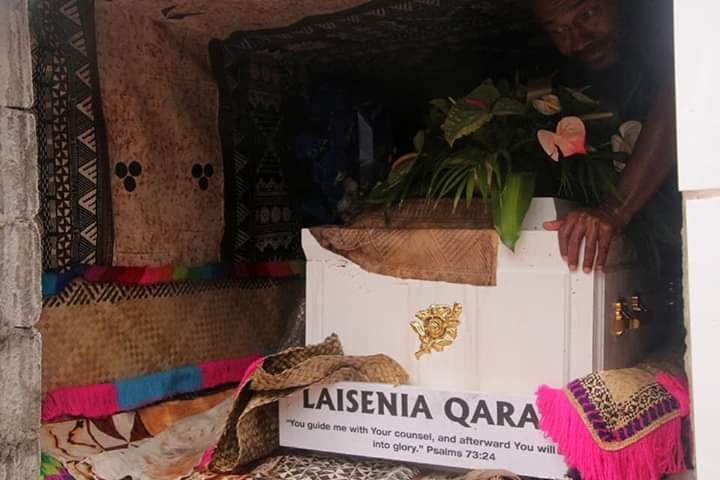Deprived of a state-funeral after his death on 21 April, supporters of Fiji’s ousted Prime Minister Laisenia Qarase helped his family to give the 79-year old leader a send-off befitting the national and populist leader that he was.
Tonnes of traditional artifacts including whales teeth, tapa and intricately woven pandanus mats were presented and ancient rituals revived for Qarase’s burial on Thursday April 30 in a newly-constructed concrete tomb, built atop a small rise in his sea-side village of Mavana, on Fiji’s eastern Lau province.
Early that day, mourners – in their hundreds – had lined the streets of the capital Suva in pouring rain to pay their final respects as the hearse carrying his body travelled from the morgue of a private hospital to a chartered plane at Nausori Airport. Many stood with umbrellas, others had their uncovered heads bowed, while others waved Fiji’s flag or banners of condolences.
Images of this spontaneous outpouring of grief mixed with messages of respect on social media showed Fiji’s opposition party leader (and former Prime Minister) Sitiveni Rabuka and his wife, as well as National Federation Party president and MP (and former Fiji First cabinet minister) Pio Tikoduadua as among those who braved the early morning rainstorm to line the main road to the airport.
The Government did lift a ban on inter-island travel and offered to meet the cost of the plane to carry the late Qarase and the ship to take the family members to Lau.
However there were no sightings of Prime Minister Frank Bainimarama, nor any members of his cabinet, or the top brass of the Republic of Fiji Military Forces (RFMF), which 14 years ago ousted Qarase from office. Bainimarama was then RFMF Commander.
The most senior government official at Qarase’s tomb was a police sergeant based on Vanuabalavu.
The senior officials’ absence, nor their refusal to afford state funeral to the semi-retired banker who was thrust into national leadership by Bainimarama himself following the civilian-led coup of 2000, which later saw Qarase contesting and winning the two general elections that followed in 2001 then again in 2006, did not dampen the spirits of Qarase supporters and his mourners.
Hundreds more filled the tarmac at the airport, singing hymns and waving Fiji flags as a Fiji Link 18-seat Twin Otter plane waited to take Qarase for the final time on a journey he had taken so many times in the past.
His widow Leba and four close family members accompanied the body of the late Prime Minister for the 50-minute flight to his final resting place at his home island of Vanuabalavu.
Such outpouring of grief and respect are rarely seen in Fiji, as it only occurs when a paramount chief or a national leader dies while in office. Such a scenes were evident in April 2004 when the country’s first founding Prime Minister who later became President of Fiji, the late Ratu Sir Kamisese Mara passed away.
But as Prime Minister at that time, it was Qarase’s government that accorded Ratu Mara a full state funeral, where flags were flown at half-mast, and the body of the high chief was laid in state at Government House, the official residence of Fiji’s president. The funeral mass was celebrated before a large crowd including overseas government representatives at Suva’s Albert Park before a flotilla of ships accompanied his body for burial at his home island of Lakeba.
And although such an honour from the state was denied for the Lau economist, his supporters were unfazed and in what looks like an act of civil defiance that was assisted by social media, organised themselves into what they later termed as the ‘peoples’ state funeral. A Facebook page created to allow supporters of Qarase to pay tribute and record their message of condolences reached nearly 20,000 members in just a fortnight.
On arrival in Vanuabalavu, rituals reserved only during the funeral of a high chief were performed, as more whales’ teeth, highly prized in Fijian tradition, and heaps of fine masi (tapa) and ibe (mats) were displayed and exchanged among mourners.
Shirt-less men blew conch shells, as women in mourning black dress sat in silence, lining both sides of the road that the pallbearers took, carpeted with more fine tapa and mats.
For one day, Vanuabalavu was united in its grief for a favourite son, who despite the trauma of being ousted from office by armed soldiers, dedicated the rest of his public life to the uplifting of the life of his people on Vanuabalavu, and to Fiji’s largest Christian denomination of which he was a staunch member, the Methodist Church of Fiji and Rotuma.
